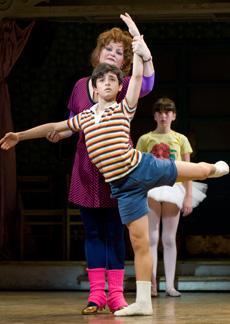“Billy Elliot the Musical” started out as a movie, a smallish, critically well received and quite popular English movie about a working class kid who wanted to become a ballet dancer. The movie became a popular hit and received some award nominations. Then, as small movies often do, it disappeared, apparently indelibly embedded in the minds of people who saw it.
If you go to the Kennedy Center’s Opera House—and you should—to see “Billy Elliot the Musical,”, you might be amazed to think that this was ever anything you could call small. The touring version is big—a really big show—big in physical size, in production qualities, and most importantly, big in ambition and heart, while rarely mushing or stooping to out-and-out sentimentality.
Oh, it’s still the same old story, one boy’s fight for leaps of glory, but it manages to be fresh, original, it manages to be about big subjects—the importance of art in lives that rarely come in contact with it, the mystery of talent, and as always, the equally mysterious natures of families. At three hours, the musical should be a bit of a slog, but it’s worth every minute, a worthy payoff of time and money and a critical success at that.
We’re in Prime Minister Margaret Thatcher’s Britain, where the national mining union has just gone on strike, and the Iron Lady is out to bust the workers in villages across the country, which may explain her natural affinity for Ronald Reagan. In one such village, Billy Elliot, an adolescent boy who’s lost his mother and lives with his belligerent father, tough brother and slightly daft grandmother, is taking boxing lessons when he accidentally wanders into a ballet class. He’s intrigued, watching the energy of the dancers under the guidance of the tough-talking, colorful Mrs. Wilkinson, but he’s also put off, because in the mining culture ballet is part of the upper class world, not to mention unmanly.
Still, he comes back, and finds something in himself—a gift for movement, flight, he’s a natural—and Mrs. Wilkinson gives him private lessons.
When pops and brother find out, they cut his budding efforts to get into the National School of Ballet short. But as the miners battle cops and scabs and run out of money, it occurs to Billy’s family and the extended family of miners that maybe Billy ought to get a chance to live his dream — and theirs — with him. And so, off they—Billy and pops—go to an audition in London, an enterprise that is often funny in a clash-of-cultures way, but also results in Billy’s audition number “Electricity” where Billy, in a bout of spectacular dancing expresses what dance means to him—its electricity, its hope, its dreams and freedom.
The show—with music by Elton John, a book by Lee Hall, choreography by Peter Darling and direction by Stephen Daldry—ended up winning 10 Tonys when it first hit Broadway. The road company requires a cast of five different Billys, and just watching, somewhat awestruck, two of the big numbers Billy is featured in, you can understand the need for a break.
Lex Ishimoto was the Billy I saw, lithe, unpretentious, a kid until he started to fly and leap. Billy talks like a normal working class kid, there’s nothing treacly here, no Oliver Twist, no David Copperfield or Tiny Tim. This is an often lonely kid who misses his mother tremendously, whose best friend is an exhibitionist gay teen who likes to wear dresses, who feels adrift in the often violent, macho world of the miners.
I expect that none of the Billys are particularly grand singers—both dance and voice are exacting disciplines that require training, and, as far as I know, there is no Rudolf Nuryev’s greatest hits album.
Darling and Daldry have done something remarkable here, they’ve put dance and music in the service of the story, instead of the other way around. In depicting the battles between cops and strikers, they’ve included the ballet dancers in seamless fashion.
“Billy Elliot” is in fact, very moving, in a tug-tug way, it delves into the fulfillment and pursuit of aspirations, it creates the world of the miners with not only drama but dance and song, some of which occasionally swerves into Les Mis territory.
And it should be said that while its hero is a kid, “Billy Elliot, the Musical” is no Disney effort. It’s gritty, with the occasional blunt, four-letter gruff language of working class types, something that we can applaud, but also approach with caution, if you’re a parent.


